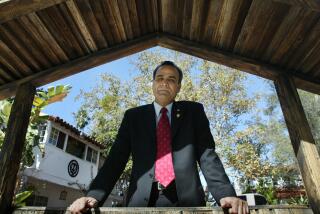Former Auditor Says Legal Fears Spurred Shredding
- Share via
HOUSTON — Former Arthur Andersen partner David B. Duncan testified Tuesday that he orchestrated a document-shredding effort Oct. 23 after listening in on an analyst conference call and realizing his firm could become a target for lawsuits and investigations as Enron Corp. collapsed.
The accounting firm, on trial in U.S. District Court in Houston, is charged with obstruction of justice for the destruction of Enron-related documents. Prosecutors have pointed to an Oct. 12 e-mail sent by an Andersen lawyer, Nancy Temple, to partners in Houston as the trigger for the destruction.
Temple’s e-mail said it would be “helpful” for the partners to comply with the document policy, which prosecutors contend was a coded signal to start shredding.
But Duncan said he didn’t act immediately on the e-mail--a disclosure that could provide an opening for Andersen’s defense lawyers. Duncan said the notion of launching a team-wide shredding effort didn’t strike him until Oct. 23, after listening in on an Enron conference call in which Wall Street analysts blasted Enron’s murky financial statements.
Under questioning from prosecutor Andrew Weissmann, Duncan said he ordered the effort “to not have a lot of extraneous material ... laying around for others to discover. In the event of civil litigation or an investigation, things that were not part of the final [audit file] could be taken out of context [and] used against the firm.”
Duncan, who pleaded guilty to obstruction of justice last month and is cooperating with the Justice Department, said he did not believe he was committing a crime when he initiated the destruction. He said he realized later that, in fact, he did believe in October that “it was a good time” to destroy Enron-related records because of the energy giant’s escalating problems and that he pleaded guilty because he wanted to “take responsibility for those actions.”
Duncan’s credibility is a pivotal issue in the case because he is expected to be the only Andersen executive to admit to directing others to shred files. Prosecutors have told the jury that, under the law, Duncan’s actions can be ascribed to the entire Andersen firm. Andersen contends the 43-year-old auditor didn’t technically violate the law and pleaded guilty under government pressure.
Rusty Hardin, Andersen’s attorney, said outside the courtroom that Duncan “was trying to do what was right” by complying with the firm’s document-retention policy, which requires keeping memos and other records to back up an auditor’s conclusions and the destruction of drafts and other files deemed unnecessary.
“I just feel sorry for him,” Hardin said. “You listen to that and you think, ‘How in the world did we end up here?’ [Duncan’s] life is in shambles because of something he didn’t think was wrong.”
Duncan, testifying for a second day, said he first huddled with three other partners working on the Enron account Oct. 23 and then instructed his assistant to gather the rest of Andersen’s Enron team--which worked in Enron’s headquarters--and told the 20 or so managers to “endeavor to come into compliance” with the policy. He said the fact that compliance included destruction of certain records “was generally understood.”
He said he started going through his desk files and e-mail for draft memos and other such records.
“I saw people cleaning out their office areas and I saw people shredding documents,” he said, noting that he had never seen such a destruction effort on a team-wide basis.
Duncan said he did not receive any instructions to cease destruction or suspend the firm’s policy as Enron’s meltdown intensified. Barely a week after Duncan reminded his subordinates about the policy, Enron received a second letter from the Securities and Exchange Commission requesting information about accounting for some transactions.
In the meantime, Andersen had been evaluating Enron’s books and concluded in early November that a partnership called Chewco had been improperly kept off the energy trader’s balance sheet, Duncan said. Andersen received an SEC subpoena Nov. 9. Partners in Houston were told to stop shredding documents.
Earlier, Duncan testified about his firm’s increasing concern about legal and regulatory actions. He said he knew that audit questions arising from the firm’s Enron work could be perilous because Andersen was under an injunction not to violate accounting rules after audit failures related to its work with Waste Management Inc.
Duncan also recounted occasions when Temple asked him to remove her name or other data from memos about Enron’s finances, saying she did not want to become a witness in potential litigation.
More to Read
Inside the business of entertainment
The Wide Shot brings you news, analysis and insights on everything from streaming wars to production — and what it all means for the future.
You may occasionally receive promotional content from the Los Angeles Times.










